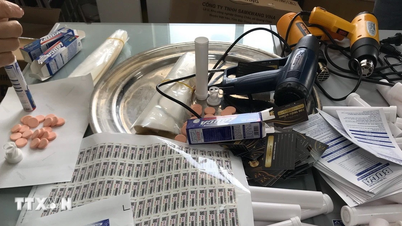Elderly and children with pneumonia due to influenza A
Recently, doctors at Medlatec General Hospital received 3 pediatric patients who are sisters in a family in Hanoi . All 3 had symptoms of high fever, no response to antipyretics, severe dry cough, left chest pain, a lot of nasal discharge, and an acute increase in symptoms. The family took them to the doctor. The rapid flu test results were positive for influenza A. 2/3 of the children were hospitalized due to complications of pneumonia.
Many medical facilities have also recorded an increase in the number of flu cases requiring hospitalization. According to information from Nghe An Obstetrics and Pediatrics Hospital, the hospital continuously receives children with symptoms of high fever, runny nose, and cough, of which about 25% are diagnosed with flu. Notably, some children are hospitalized after 3-4 days of illness and have complications such as pneumonia and otitis media, prolonging the treatment time. Most of these cases are due to parents arbitrarily using medicine to treat their children at home without a doctor's prescription or bringing their children to the clinic late.

A case of severe influenza A complications requiring intensive treatment. (Photo: TT).
Along with young children, the elderly infected with influenza also have many consequences. At the Vietnam-Soviet Friendship Hospital, many patients had to be hospitalized for pneumonia treatment due to the attack of influenza A virus. Currently taking care of his mother being treated here, Mr. NTD (Hanoi) said: "Before that, my mother treated the flu at home for about a week, but not only did it not get better, her cough became worse, her difficulty breathing became worse, the family took her to a medical facility for examination and was found to have influenza A...". With her condition worsening and many underlying diseases, Mr. D's mother was taken to the Department of Tropical Diseases, Friendship Hospital to continue treatment for influenza A, lung fungus and multi-resistant bacteria.
Do not take antibiotics by yourself when you have the flu.
MSc. Dr. Tran Thi Kim Ngoc, Pediatrics, Medlatec General Hospital said: Influenza A accounts for 75% of influenza cases in humans. Influenza A virus can be transmitted from infected poultry to humans through close contact, however, it is more common to spread from person to person through the respiratory tract.
According to Dr. Dong Phu Khiem, Deputy Director of the Intensive Care Center, Central Hospital for Tropical Diseases, seasonal flu can be said to have low virulence, so it usually only causes severe flu symptoms in people with high risk factors (such as the elderly > 65 years old, young children, pregnant women in the last 3 months, people with underlying respiratory, cardiovascular, immunodeficiency diseases...). Therefore, people should not be too panicked about seasonal flu, but should not be subjective, especially for groups at risk of severe flu infection.
In addition, influenza A virus also exists on surfaces such as doorknobs, clothes, phones, dishes and everyday items. Influenza virus can survive on these surfaces for up to 48 hours, facilitating community spread.
People with influenza A will have some typical symptoms such as: high fever, prolonged fever, sore throat, pharyngitis, frequent and prolonged cough, chills, difficulty breathing, fatigue, watery eyes when going out in the light. Infected children are very susceptible to vomiting or diarrhea.
Most patients with influenza A recover within 2-7 days. However, those in high-risk groups (children, the elderly, pregnant women and those with underlying medical conditions) are at risk of complications such as: severe pneumonia, otitis media, sinusitis, urinary tract infections, cerebral edema, liver damage, and even miscarriage.
Dr. Ngoc recommends that when acute symptoms of suspected influenza appear, patients should go to a medical facility for examination, diagnosis and appropriate treatment. At the same time, it is necessary to closely monitor clinical developments to detect early and promptly handle dangerous complications caused by influenza.
Regarding the current influenza A epidemic, Dr. Dong Phu Khiem, Deputy Director of the Intensive Care Center, Central Hospital for Tropical Diseases, noted: "When having the flu, people should not arbitrarily buy antibiotics to use because antibiotics are not effective against the flu but have many harmful effects in this case. At the same time, people should not arbitrarily buy antiviral drugs to treat the flu. Buying antiviral drugs to treat the flu on their own is unnecessarily costly, can cause drug shortages, causing difficulties for those who need them, or increase drug resistance.
"Antiviral drugs are only beneficial for people at risk of severe influenza infection, people with severe symptoms of influenza infection. People with underlying medical conditions need to pay close attention. When they have symptoms of fever, sore throat, sneezing, or runny nose, they should go for a flu screening so that the doctor can evaluate and consider early use of antiviral drugs to help prevent the risk of severe influenza infection," Dr. Khiem emphasized.
Source: https://www.baogiaothong.vn/ton-thuong-phoi-sau-nhiem-cum-a-luu-y-dau-hieu-can-nhap-vien-19225020711491637.htm



![[Photo] General Secretary To Lam visits exhibition of achievements in private economic development](https://vphoto.vietnam.vn/thumb/1200x675/vietnam/resource/IMAGE/2025/5/18/1809dc545f214a86911fe2d2d0fde2e8)

![[Photo] National conference to disseminate and implement Resolution No. 66-NQ/TW and Resolution No. 68-NQ/TW of the Politburo](https://vphoto.vietnam.vn/thumb/1200x675/vietnam/resource/IMAGE/2025/5/18/adf666b9303a4213998b395b05234b6a)

![[Photo] More than 17,000 candidates participate in the 2025 SPT Competency Assessment Test of Hanoi National University of Education](https://vphoto.vietnam.vn/thumb/1200x675/vietnam/resource/IMAGE/2025/5/17/e538d9a1636c407cbb211b314e6303fd)




























![[Photo] Prime Minister Pham Minh Chinh chairs meeting on science and technology development](https://vphoto.vietnam.vn/thumb/1200x675/vietnam/resource/IMAGE/2025/5/17/ae80dd74c384439789b12013c738a045)






























































Comment (0)